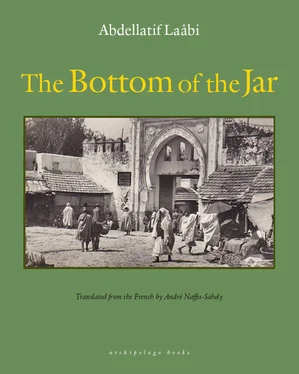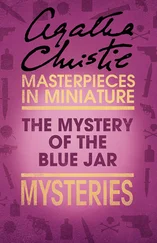Namouss, on the other hand, continued on his quest. He ran through the saddlers’ souk so that Driss wouldn’t see him. His destination, the horm , the sanctuary of Moulay Idriss.
LEANING ON THE guardrail that cordoned off the horm , as always, is Bidouss, the one-legged beggar. Despite his wooden leg, the man stands up to his full height. Like Uncle Touissa, he is wearing a black overcoat. While other beggars look miserable and try to outdo one another with their catchy laments, Bidouss remains sober and composed. His only request, which he delivers in a monotone, is astonishing, to say the least: “One hundred reals for God!” One hundreds reals, and nothing less, quite a sum! Such a claim astonishes Namouss. At the same time, he is deeply impressed. If Bidouss is asking for so much, it must mean that he’s worth it. Hence the respect he inspires. Besides, his reason for being there is that he’s on a quest. He could wait for hours on end — this did not happen every day — for a believer to pull out a large note and hand it over to our man, who would then pack up and leave, disappearing into the crowd only to return the next day.
Roaming around the horm , despite the throngs of people — or rather because of them — was a complicated pleasure for Namouss. There was a group of women there, some jostling for position, while others clustered around little boutiques to buy decorative candles, sandalwood, or orange blossom water, butternut bark, and kohl. Among the female population, there were also young girls, and thanks to the layout of the premises, one could meet their eye, unlike when they rushed through the neighborhood at such a pace that one could barely get a glimpse of them. But to actually speak to them? Hchouma (shame) — that was simply impossible. Curiously enough, however, moving around in this holy place often forced people to press up against one another, even though, out of politeness, everyone tried to slip past with the least possible contact. This did not prevent a certain amount of confusion, which was exacerbated by the stifling atmosphere and the fragrances the perfume-sellers burned in order to better intoxicate their customers.
Namouss was aware of these things. But this awareness did not extend to the torments of the flesh. What distracted him for the moment was his mischievous sense of humor. Alas, he would not be able to give free rein to it. While he was in the company of his neighborhood buddies, Namouss was able to become bolder and take part in a cruel game whose victims were exclusively female. The game consisted of taking advantage of the rush of people and the feverish touting of wares to attach the ends of two or three women’s djellabas together with a safety pin. The more adept ones would use a needle and thread and actually stitch them together. They would then follow their victims right up to the exit of the horm . When the women would attempt to go their separate ways, they would become aware of the problem, the nasty trick would be exposed, and hilarity would ensue. Curses would rain down on the children’s heads, and they would scatter like a flock of sparrows.
Namouss would then do the best he could to reach Bab Loufa, which would allow him access to the central basin of the mosque. This was where the children would rendezvous since their presence wasn’t tolerated in the prayer rooms. In order to lend weight to their supposedly pious intentions, they would pretend to perform their ablutions, a ritual that, thanks to the heat and resultant need to freshen up, quickly — and chaotically — devolved into a case of the sprayer getting sprayed. This would signal the entrance of a dreaded character, whose purpose for being there was to ensure the tranquillity of the worshippers and that the place was treated with respect. The children knew him by the name of the instrument he carried with him to keep the peace: Bou Souita, Father Whip — a boundless whip. A quince handle with a long, long leather lash attached to one end, which allowed him to strike the fugitives even in the farthest reaches of the square, dealing out blows in a most democratic fashion. Once the delinquents had been beaten and had dispersed, Bou Souita was free to attend to his other tasks, at which point the rabble-rousers would regroup, this time in a slightly more organized way. Lookouts would be designated in case Bou Souita should return unexpectedly. And the games would start over.
At this point in his peregrination, Namouss inexplicably felt a different sort of need. He therefore joined up with a few of the kids there and performed his ablutions with actual dedication. He wasn’t sure he was proceeding through the steps of the ritual in an orderly fashion, but he didn’t really care since, as Driss was found of saying, at least his heart was in the right place. He would then leave the group behind and head toward the room where the city’s patron saint was resting. His head held high, he took a few measured steps and assumed an inspired composure. If he was to be admitted into the holiest of holies, his face must show his heart was in the right place. And it worked. He went in and approached the grille surrounding the mausoleum. His heart was racing. Was it fear? Fear of what? Or was it that he was the only child in the midst of so many patriarchs, people who usually commanded respect but who were now kneeling submissively in front of the grille, murmuring prayers or expressing their weaknesses and their hopes for help in their time of need? He didn’t know. His legs buckled and he found himself on his knees. He reflected on what he would say. He didn’t feel particularly unhappy and had nothing to ask for. The only thing that came to mind was the beginning of the new school year. He really wanted to do well at school. He wanted to succeed. The words issued without a hitch. He formulated his vow, kissed the grille, drew back, and sat down cross-legged. He thought he had won the right to be there and to leisurely observe everything that was going on around him. The people there, either seated or reclining in Roman style, would abandon themselves to their reveries, indifferent to the passing of time. This despite the fact that the walls were decorated with large clocks whose swaying pendulums produced a subdued cacophony, even though all the faces showed the same time. Namouss was stunned by the array of timekeeping instruments juxtaposed with the people present who, having found refuge in the saint’s mausoleum, had wholly detached themselves from earthly concerns. He too had abandoned himself to a reverie. He grew wings once again. He rose up and up through the sky until he was blinded by a dazzling light. He forced his eyes open, because he knew the Face would appear before him. A moment later, he saw Him on His throne. A stern-looking old man with a magnificent beard, who held out His hand. Namouss kissed it and immediately an incredible feeling of strength flowed through him. But a voice brought his euphoria to an end.
“Have you performed your ablutions properly?”
Namouss fell from great heights since this question planted the seed of doubt in his soul. He came to the moment Bou Souita’s shadow fell across the room. Panicking, Namouss took off and went to warn his friends, who as it turns out hadn’t waited for him.
He found them conferring among themselves by the doors of the mosque. One of them had reported seeing Aâssala not far from there, beside the Qarawiyyin. The group decided to go and meet her.
Aâssala, the cat lady, virtual mute, vagabond. Namouss had a soft spot for her, despite his fervent denials. Fact was that she was tied to a story that had tormented him for a long time, something that began when he was very little. Who had inflicted this trauma on him, had it been Ghita or had it been Zhor, his sister? He couldn’t remember. It had all started when someone had alleged with the utmost seriousness that Namouss was in reality an orphan. That he had been found armed with a jug in the Jnan Sbil gardens selling water to passing strollers. The family had taken pity on him and brought him home. For Namouss, the whole story had transformed into a tragedy. He avoided getting into trouble, since each time he was caught out, the same old threat would resurface: If he ever did it again, they would give him his jug back and leave him in the garden so he could take up his old trade. Where did they keep the damned jug? Namouss had looked for it all over the house in vain. Even when happiness reigned in the family the doubt had never left him, despite the family trying its best to reassure him by saying the whole story had just been one big joke. But on less joyous occasions, the family would take their gag even further. Since he was a foundling, when it would later become time for him to marry, no one would want him. One day, while he was telling the children not to pester Aâssala, the cat lady, meskina , the poor thing, someone yelled, “Here’s an idea! Why don’t you marry her?”
Читать дальше












